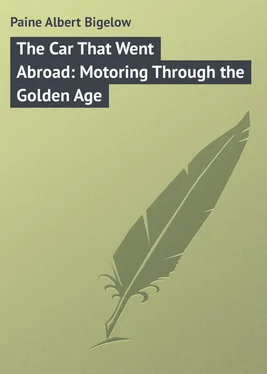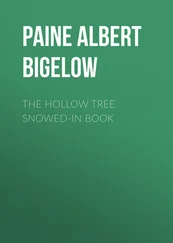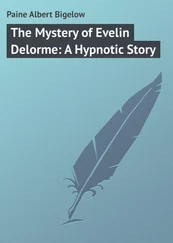Albert Paine - The Car That Went Abroad - Motoring Through the Golden Age
Здесь есть возможность читать онлайн «Albert Paine - The Car That Went Abroad - Motoring Through the Golden Age» — ознакомительный отрывок электронной книги совершенно бесплатно, а после прочтения отрывка купить полную версию. В некоторых случаях можно слушать аудио, скачать через торрент в формате fb2 и присутствует краткое содержание. Жанр: foreign_prose, Путешествия и география, на английском языке. Описание произведения, (предисловие) а так же отзывы посетителей доступны на портале библиотеки ЛибКат.
- Название:The Car That Went Abroad: Motoring Through the Golden Age
- Автор:
- Жанр:
- Год:неизвестен
- ISBN:нет данных
- Рейтинг книги:5 / 5. Голосов: 1
-
Избранное:Добавить в избранное
- Отзывы:
-
Ваша оценка:
- 100
- 1
- 2
- 3
- 4
- 5
The Car That Went Abroad: Motoring Through the Golden Age: краткое содержание, описание и аннотация
Предлагаем к чтению аннотацию, описание, краткое содержание или предисловие (зависит от того, что написал сам автор книги «The Car That Went Abroad: Motoring Through the Golden Age»). Если вы не нашли необходимую информацию о книге — напишите в комментариях, мы постараемся отыскать её.
The Car That Went Abroad: Motoring Through the Golden Age — читать онлайн ознакомительный отрывок
Ниже представлен текст книги, разбитый по страницам. Система сохранения места последней прочитанной страницы, позволяет с удобством читать онлайн бесплатно книгу «The Car That Went Abroad: Motoring Through the Golden Age», без необходимости каждый раз заново искать на чём Вы остановились. Поставьте закладку, и сможете в любой момент перейти на страницу, на которой закончили чтение.
Интервал:
Закладка:
It was fascinating. I don't think one of us thought of jumping out and leaving the car to its fate. The truck driver was frantically urging his team forward, hoping the wheels would catch, but only making them slide a little quicker in our direction. They were six inches away, now – five inches – three inches – one inch – the end of the hub was touching our mud guard. What we might have done then – what might have happened remains guesswork. What did happen was that the huge steel tire reached a joint in the tram rail and unhurriedly lifted itself over, just as if that was what it had been intending to do all the time. I had strength enough left to get out and crank up, then, but none to spare. A little more paint off the front end of the mud guard, but that was nothing. I had whetted those guards on a variety of things, including a cow, in my time. At home I had a real passion for scraping them against the door casing of the garage, backing out.
Still, we were pretty thoughtful for several miles and missed a road that turns off to Arles, and were on the way to Aix, which we had already visited by tram. Never mind; Aix was on the way to Arles, too, and when all the roads are good roads a few miles of motor travel more or less do not count. Only it is such a dusty way to Aix, and we were anxious to get into the cleaner and more inviting byways.
We were at the outskirts, presently, and when we saw a military-looking gentleman standing before a little house marked " L'Octroi " we stopped. I had learned enough French to know that l'octroi means a local custom house, and it is not considered good form to pass one of them unnoticed. It hurts the l'octroi man's feelings and he is backed by the gendarmerie of France. He will let you pass, and then in his sorrow he will telephone to the police station, just ahead. There you will be stopped with a bayonet, or a club, or something, and brought back to the l'octroi , where you will pay an amend of six francs; also costs; also for the revenue stamp attached to your bill of particulars; also for any little thing which you may happen to have upon which duty may be levied; also for other things; and you will stand facing a half-open cell at the end of the corridor while your account is being made up – all of which things happened to a friend of mine who thought that because an octroi man looked sleepy he was partly dead. Being warned in this way, we said we would stop for an octroi man even if he were entirely dead; so we pulled up and nodded politely, and smiled, and said, "Bon joor, messoor," and waited his pleasure.
You never saw a politer man. He made a sweeping salute and said – well, it doesn't matter just what he said – I took it to be complimentary and Narcissa thought it was something about vegetables. Whatever it was, we all smiled again, while he merely glanced in the car fore and aft, gave another fine salute and said, " Allay " whereupon we understood, and allayed , with counter-salutes and further smiles – all of which seemed pleasanter than to be brought back by a gendarme and stood up in front of a cell during the reckoning process.
Inquiring in Aix for the road to Arles we made a discovery, to wit: they do not always pronounce it "Arl" in the French way, but "Arlah," which is Provençal, I suppose, the remains of the old name "Arlate." One young man did not seem even to recognize the name Arles, though curiously it happened that he spoke English – enough, at least, to direct us when he found that it was his Provençal "Arlah" that we wanted.
So we left Aix behind us, and with it the dust, the trams, and about the last traces of those modern innovations which make life so comfortable when you need them and so unpeaceful when you prefer something else. The one great modern innovation which bore us silently along those level roads fell into the cosmic rhythm without a jar – becoming, as it seemed, a sort of superhuman activity, such as we shall know, perhaps, when we get our lost wings again.
I don't know whether Provence roads are modern or not. I suspect they were begun by the Roman armies a good while ago; but in any case they are not neglected now. They are boulevards – no, not exactly that, for the word "boulevard" suggests great width. They are avenues, then, ample as to width, and smooth and hard, and planted on both sides with exactly spaced and carefully kept trees. Leaving Aix, we entered one of these highways running straight into the open country. Naturally we did not expect it to continue far, not in that perfectly ordered fashion, but when with mile after mile it varied only to become more beautiful, we were filled with wonder. The country was not thickly settled; the road was sparsely traveled. Now and then we passed a heavy team drawing a load of hay or grain or wine barrels, and occasionally, very occasionally, we saw an automobile.
It was a fair, fertile land at first. There were rich, sloping fields, vineyards, olive gardens, and plumy poplars; also, an occasional stone farmhouse that looked ancient and mossy and picturesque, and made us wish we could know something of the life inside its heavy walls. We said that sometime we would stop at such a place and ask them to take us in for the night.
Now and then we passed through a village, where the streets became narrow and winding, and were not specially clean. They were interesting places enough, for they were old and queer, but they did not invite us to linger. They were neither older nor more queer than corners of Marseilles we had seen. Once we saw a kind of fair going on and the people in holiday dress.
At Salon, a still larger and cleaner place, we stopped to buy something for our wayside luncheon. Near the corner of a little shaded square a man was selling those delectable melons such as we had eaten in Marseilles; at a shop across the way was a window full of attractions – little cheeses, preserved meats, and the like. I gathered up an assortment, then went into a boulangerie for bread. There was another customer ahead of me, and I learned something, watching his transaction. Bread, it seemed, was not sold by the loaf there, but by exact weight. The man said some words and the woman who waited on him laid two loaves, each about a yard long, on the scales. Evidently they exceeded his order, for she cut off a foot or so from one loaf. Still the weight was too much, and she cut off a slice. He took what was left, laid down his money, and walked out. I had a feeling that the end and slice would lie around and get shopworn if I did not take them. I pointed at them, and she put them on the scales. Then I laid down a franc, and she gave me half a gill of copper change. It made the family envious when they saw how exactly I had transacted my purchase. There is nothing like knowing the language. We pushed on into the country again, stopped in a shady, green place, and picnicked on those good things for which we had spent nearly four francs. There were some things left over, too; we could have done without the extra slice of bread.
There were always mountains in view, but where we were the land had become a level plain, once, ages ago, washed by the sea. We realized this when the fertile expanse became, little by little, a barren – a mere waste, at length, of flat smooth stones like cobble, a floor left by the departing tides. "La Crau" it is called, and here there were no homes. No harvest could grow in that land – nothing but a little tough grass, and the artificially set trees on either side of the perfectly smooth, perfectly straight road that kept on and on, mile after mile, until it seemed that it must be a band around the world. How can they afford to maintain such a road through that sterile land?
The sun was dropping to the western horizon, but we did not hurry. I set the throttle to a point where the speedometer registered fifteen miles an hour. So level was the road that the figures on the dial seemed fixed there. There was nothing to see but the unbroken barren, the perfectly regular rows of sycamore or cypress, and the evening sky; yet I have seldom known a drive more inspiring. Steadily, unvaryingly, and silently heading straight into the sunset, we seemed somehow a part of the planetary system, little brother to the stars.
Читать дальшеИнтервал:
Закладка:
Похожие книги на «The Car That Went Abroad: Motoring Through the Golden Age»
Представляем Вашему вниманию похожие книги на «The Car That Went Abroad: Motoring Through the Golden Age» списком для выбора. Мы отобрали схожую по названию и смыслу литературу в надежде предоставить читателям больше вариантов отыскать новые, интересные, ещё непрочитанные произведения.
Обсуждение, отзывы о книге «The Car That Went Abroad: Motoring Through the Golden Age» и просто собственные мнения читателей. Оставьте ваши комментарии, напишите, что Вы думаете о произведении, его смысле или главных героях. Укажите что конкретно понравилось, а что нет, и почему Вы так считаете.












